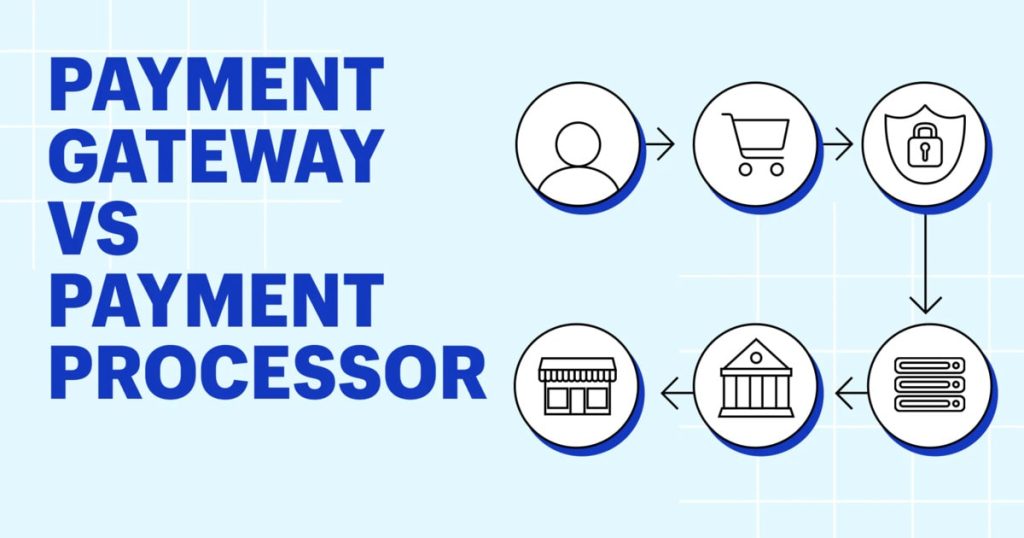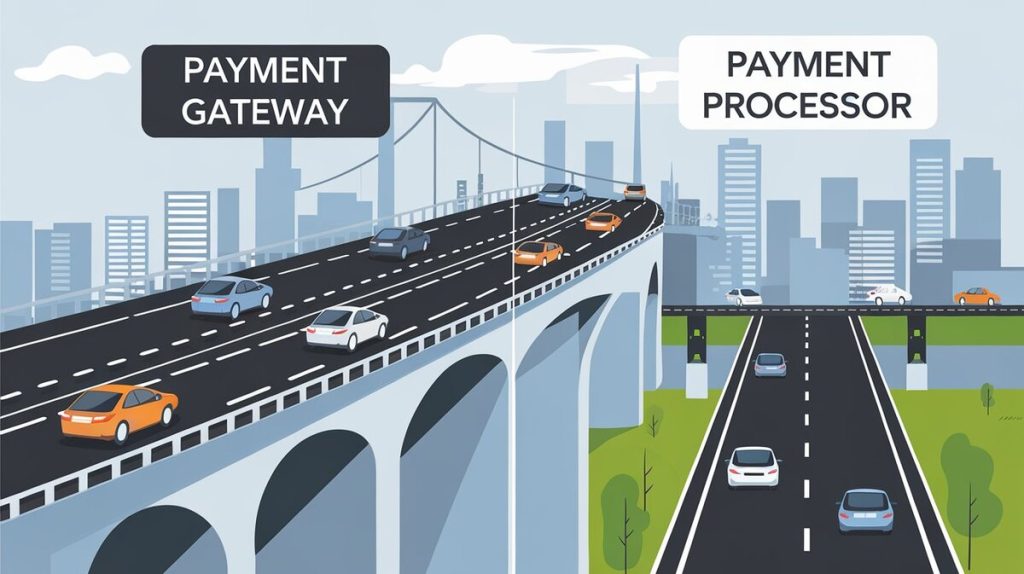Introduction
For businesses involved in online and card-present transactions, understanding the roles of payment gateways and payment processors is critical. These tools ensure secure, efficient payments, but they serve different purposes in the transaction process. This guide breaks down the key differences and practical uses for each, helping you decide what your business needs to operate effectively and securely.
What is a Payment Gateway?
A payment gateway is a software application that captures and securely transmits payment data from customers to a payment processor. It’s essential for online transactions, providing encryption to protect sensitive information, and ensures compliance with standards like PCI DSS (Payment Card Industry Data Security Standard).
Key Functions:
- Encryption: Encrypts card data to protect it from fraud.
- Authorization: Communicates with the issuing bank to approve or decline transactions.
- Integration: Connects with shopping carts, e-commerce platforms, and POS systems.
Examples:
- Stripe: Offers advanced security features and integrates with multiple platforms.
- Authorize.net: Popular among small businesses for its reliability and ease of use.
- PayPal: Widely trusted and easy to integrate with various e-commerce platforms.
Fact: Global e-commerce sales in 2023 hit $5.7 trillion, with secure payment gateways helping businesses reduce fraud by over 30%.
| Feature | Stripe | Authorize.net | PayPal |
|---|---|---|---|
| Transaction Fee | 2.9% + $0.30 | 2.9% + $0.30 | 2.9% + $0.30 |
| PCI Compliance | Yes | Yes | Yes |
| Chargeback Protection | Yes (extra fee) | Yes | Yes |
| Fraud Detection | Advanced | Standard | Standard |
What is a Payment Processor?
A payment processor manages the transfer of funds between the customer’s bank and the merchant’s account. It facilitates communication between the issuing bank, acquiring bank, and card network, ensuring transactions are processed correctly and funds are settled.
Key Functions:
- Fund Transfer: Moves authorized funds to the merchant’s account.
- Communication: Facilitates communication between banks and card networks.
- Settlement: Ensures the transaction is completed and funds are properly deposited.
Examples:
- Square: Serves both in-person and online transactions with easy setup.
- Checkout.com: Known for low fees and global transaction support.
- Braintree: Offers multi-currency processing with advanced security.
Fact: Visa processes over 500 million transactions daily across its global network.
| Processor | Transaction Fee | Features | Best for |
|---|---|---|---|
| Square | 2.75% (in-person) | POS systems, mobile payments | Small businesses |
| Checkout.com | 2.9% + $0.30 | Low fees, international payments | Global businesses |
| Braintree | 2.9% + $0.30 | Multi-currency, fraud protection | Large businesses |

Key Differences Between Payment Gateways and Payment Processors
Although both are integral to digital transactions, payment gateways and payment processors perform distinct roles. Below is a clear comparison of their functions and applications.
| Criteria | Payment Gateway | Payment Processor |
|---|---|---|
| Role | Captures and encrypts payment data | Facilitates fund transfers |
| Used For | Online transactions | Online and in-person payments |
| Fraud Prevention | Advanced encryption | Monitors transactions |
| Integration | Connects with e-commerce platforms | Connects with financial institutions |
| Examples | Stripe, PayPal, Authorize.net | Square, Braintree, Checkout.com |
When to Use a Payment Gateway vs. a Payment Processor
Payment gateways are necessary for businesses that conduct online transactions, as they handle the secure transmission of payment data. Payment processors are required for all card-based transactions, managing the communication and settlement between banks.
When to Choose a Payment Gateway:
- E-commerce businesses: Essential for secure online transactions.
- Card-not-present transactions: Necessary for remote sales.
- Global operations: Handles multi-currency transactions securely.
When to Choose a Payment Processor:
- In-person retail: Supports POS systems for direct payments.
- Mobile payments: Enables transactions through mobile apps and devices.
- High transaction volumes: Efficiently manages large-scale payment processing.
Tip: For chargeback prevention, consider Merchanto.org, an official partner of VISA and MasterCard. Their services help businesses mitigate risks and reduce losses from chargebacks. For more information, visit Merchanto.org.

Combined Payment Solutions
Some providers offer integrated solutions that combine the functions of payment gateways and processors. These all-in-one services are ideal for businesses looking to streamline their payment systems.
Examples of Combined Solutions:
- Stripe: Integrates payment gateway and processor functions with extensive support for global transactions.
- Braintree: A comprehensive solution from PayPal, offering multi-currency processing and robust security features.
- Square: Provides an integrated solution with POS systems, virtual terminals, and online payment processing.
Fact: Businesses using combined solutions like Stripe see 25% faster checkout times, improving customer satisfaction and increasing sales.
| Solution | Pros | Cons |
|---|---|---|
| Stripe | Seamless integration, global reach | Higher fees for certain transactions |
| Braintree | Multi-currency, high security | Complex setup for large businesses |
| Square | Ideal for in-person and mobile payments | Limited global reach |
Conclusion
Choosing between a payment gateway and a payment processor depends on your business model and transaction needs. E-commerce businesses benefit from both services to ensure secure, efficient payment handling. Brick-and-mortar stores may only require a reliable payment processor with POS capabilities.
Tables and Data Analysis
Comparison of Popular Payment Gateways
| Gateway | Transaction Fee | Fraud Detection | Global Reach | Support |
|---|---|---|---|---|
| Stripe | 2.9% + $0.30 | Advanced | 100+ countries | 24/7 Support |
| Authorize.net | 2.9% + $0.30 | Basic | Limited | Phone Support |
| PayPal | 2.9% + $0.30 | Standard | Global | Limited |
Top Payment Processors by Features
| Processor | Chargeback Protection | Multi-Currency | Transaction Speed | Best for |
|---|---|---|---|---|
| Square | Basic | Yes | Fast | Retail businesses |
| Checkout.com | Advanced | Yes | Very Fast | Global businesses |
| Braintree | Yes | Yes | Moderate | Large businesses |
All-in-One Payment Solutions: Pros and Cons
| Solution | Pros | Cons |
|---|---|---|
| Stripe | Seamless integration, global reach | Higher fees for certain transactions |
| Braintree | Multi-currency, high security | Complex setup for large businesses |
| Square | Ideal for in-person and mobile payments | Limited global reach |



